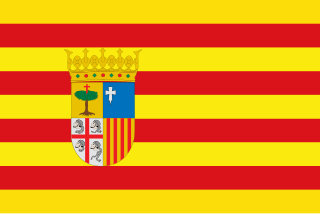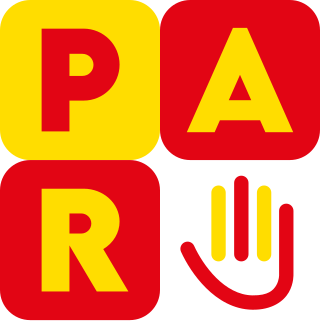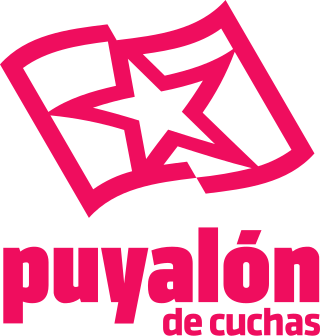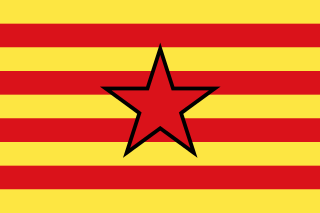
Aragon is an autonomous community in Spain, coextensive with the medieval Kingdom of Aragon. In northeastern Spain, the Aragonese autonomous community comprises three provinces : Huesca, Zaragoza, and Teruel. Its capital is Zaragoza. The current Statute of Autonomy declares Aragon a historic nationality of Spain.

The Aragonese Party is a political party which advocates the interests of Aragon within Spain. The party was founded in 1978 under the name Aragonese Regionalist Party, but changed its name in 1990, keeping the initials PAR. The founders of PAR included Emilio Eiroa, who later served as the President of the Government of Aragon from 1991 to 1993.

José Antonio Labordeta Subías was a Spanish (Aragonese) singer, songwriter, poet, writer and political activist. He was described by The Gran Enciclopedia Aragonesa 2000 as "The most important Aragonese singer-songwriter". He began singing in an attempt to give more relevance to his poetry; his songs are well-known and beloved anthems in Aragón. Poetic songs such as "Aragón", "Canto a la Libertad" or "Me dicen que no quieres" were also sung all around Spain.

Pancrudo is a municipality in the Teruel Community comarca, Teruel province, Aragon, Spain. According to the 2010 census the municipality had a population of 136 inhabitants. Its postal code is 44720. Its distance from the provincial capital, Teruel is 56 kilometres.

La Puebla de Híjar is a town and municipality in the Bajo Martín comarca, Teruel province, Aragón, Spain. It has a population of 1,046, an area of 61 km² and is located near N-232 road.

Estado Aragonés was a small Aragonese left-wing political party, and the first in the Region regarded as fully nationalist. It was founded in Barcelona in the winter of 1933, during the Second Spanish Republic. Many of their members came from Unión Aragonesista and were primarily emigrant Aragonese workers from the north-east county of Ribagorza. The president was Gaspar Torrente.

The 1983 Aragonese regional election was held on Sunday, 8 May 1983, to elect the 1st Cortes of the autonomous community of Aragon. All 66 seats in the Cortes were up for election. The election was held simultaneously with regional elections in twelve other autonomous communities and local elections all throughout Spain.

The 1999 Aragonese regional election was held on Sunday, 13 June 1999, to elect the 5th Cortes of the autonomous community of Aragon. All 67 seats in the Cortes were up for election. The election was held simultaneously with regional elections in 12 other autonomous communities and local elections all throughout Spain, as well as the 1999 European Parliament election.

The 2011 Aragonese regional election was held on Sunday, 22 May 2011, to elect the 8th Cortes of the autonomous community of Aragon. All 67 seats in the Cortes were up for election. The election was held simultaneously with regional elections in 12 other autonomous communities and local elections all throughout Spain.

Puyalón de Cuchas is an Aragonese left-wing nationalist political party formed in 2008, after a split from the Chunta Aragonesista.

United Left of Aragon is the Aragonese federation of the Spanish left wing political and social movement United Left. Adolfo Barrena Salces is the current General Coordinator. The major member of the coalition is the Communist Party of Aragon.
Socialist Party of Aragon was a democratic socialist political party in Aragón, Spain.

Aragonese nationalism is a political movement that seeks greater regional autonomy from the Spanish State for Aragon, and even its independence. Its principles are based on the idea that Aragon is a historical nation having been a kingdom in its own right, with its history, monarchs, laws, currency, language and culture.
Canto a la libertad is the most well-known song by Aragonese singer-songwriter José Antonio Labordeta. It was composed in 1975 to represent "a dream of solidarity, humanity, social justice, hope and freedom" and constitute "a hymn to the Aragonese people".

Luis María Beamonte Mesa is a Spanish People's Party politician. He is a member of the Cortes of Aragon, where he has led his party since 2019. He was previously the mayor of Tarazona (2007–2019) and president of the provincial deputation of the Province of Zaragoza (2011–2015).

Chesús Gregorio Bernal Bernal was a Spanish academic and politician. He was a professor at the University of Zaragoza, specialising in Romance languages. In 1986, he co-founded the Chunta Aragonesista (CHA), and served in the Cortes of Aragon from 1995 to 2011.
Jorge Pueyo Sanz is a Spanish lawyer, politician, television presenter. He has collaborated in Charrín Charrán and currently presents A escampar la boira. Since 2023 he has been a deputy in the XV Legislature for Sumar.
















